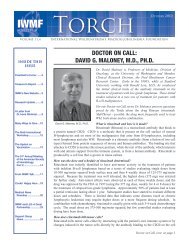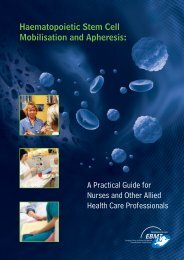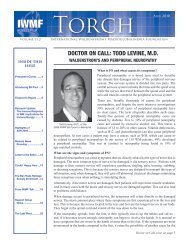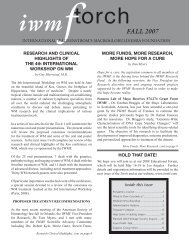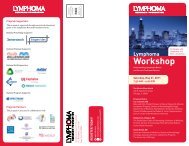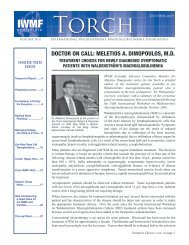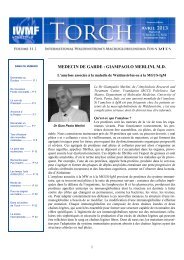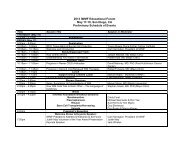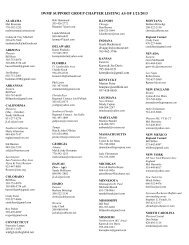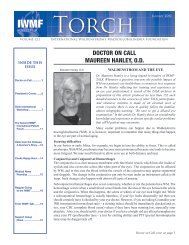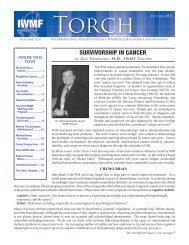English - International Waldenstrom's Macroglobulinemia Foundation
English - International Waldenstrom's Macroglobulinemia Foundation
English - International Waldenstrom's Macroglobulinemia Foundation
You also want an ePaper? Increase the reach of your titles
YUMPU automatically turns print PDFs into web optimized ePapers that Google loves.
SHOULD I GET A SECOND OPINION?<br />
b y Morie A. Gertz, M.D., M.A.C.P.<br />
Whether an individual should get a second opinion for a medical<br />
condition is not a simple “yes” or “no” question. The answer<br />
is dependent upon the patient’s level of trust and relationship<br />
with the physician, the level of confidence in the facilities of<br />
the associated medical center, plus the patient’s understanding<br />
of the condition and the therapeutic options available.<br />
There are many very well trained medical oncologists in<br />
practice who have received superb mentorship at large<br />
academic medical centers and who are extremely bright and<br />
facile in the management of malignant disease. Unfortunately,<br />
in most practices, Waldenström’s macroglobulinemia<br />
constitutes no more than one-half of 1% of a general oncology<br />
practice. As a consequence, in most practices, a physician<br />
can be expected to see a patient with newly diagnosed<br />
Waldenström’s every second or third year. This raises very<br />
unique issues for Waldenström’s patients, issues that are<br />
not shared by patients with breast, colon, lung, prostate, or<br />
stomach cancer.<br />
In the case of a disease with unique issues, there is no greater<br />
teacher than direct experience. I, myself, am extremely<br />
thankful to all the Waldenström’s macroglobulinemia<br />
patients whom I have had the privilege to see and serve over<br />
the years because they have taught me more about the disease<br />
than anything that can be printed or written in manuscripts or<br />
textbooks. A reasonable metaphor to consider is as follows.<br />
How would you feel if a plumber came to your house, a<br />
problem was reported, and his response was: “I have never<br />
seen this type of hydraulic problem before, but I brought my<br />
plumber’s manual with me to help me manage the situation.”<br />
How comfortable would you be in this situation?<br />
A similar example would be if you brought your car to a<br />
repair shop and you were told, “I have never seen this type<br />
of automotive problem before in my career, but I will read<br />
the manual, which should get me up to speed with the types<br />
of problems your car has had.” Do you not owe it to yourself<br />
to treat yourself better than you would your car or your<br />
plumbing? Would you place your trust concerning a medical<br />
problem in an individual with no experience pertinent to the<br />
problem at hand?<br />
Speaking personally, I would prefer to consult with someone<br />
who graduated in the middle of their medical school class<br />
but who had decades of experience with my problem than<br />
with someone who, while graduating first in their class, had<br />
no experience with the problem but committed themselves to<br />
learn as much as they possibly could about it. I would not<br />
choose this second option. I would not allow this to occur at<br />
my own expense. I think, in the situation where a practitioner<br />
has limited experience, it is reasonable to obtain a second<br />
opinion to help guide care.<br />
There are other issues. In medical centers that have extensive<br />
experience with the disease, oftentimes research is actively<br />
ongoing. Being seen as a patient at a medical center may allow<br />
the biobanking of specimens such as blood and bone marrow<br />
that could be used for a better understanding of the disease<br />
itself. The finding of the MYD88 mutation was certainly<br />
derived from patients who were willing to allow research on<br />
their blood and bone marrow, thus leading to a breakthrough<br />
discovery applicable to all patients with Waldenström’s<br />
macroglobulinemia. Therefore, it is relevant to ask whether<br />
the diagnostic testing that you are subjected to will benefit<br />
other patients or is simply being used as a diagnostic tool.<br />
At medical centers where Waldenström’s macroglobulinemia<br />
is infrequently seen, there may be no available treatment<br />
protocols designed by the best and brightest in the field to<br />
move outcomes to the next superior level. Being seen at a<br />
medical center that specializes in Waldenström’s offers the<br />
potential for clinical trial participation that might in turn<br />
allow treatment with a brand new agent that is promising<br />
in Waldenström’s or might allow treatment with new<br />
combinations of existing agents. Either way, the resulting<br />
outcomes are potentially better than at other medical centers<br />
that do not provide such options. These types of protocols<br />
are frequently unavailable at smaller medical centers because<br />
the cost of opening clinical trials where accrual numbers<br />
are expected to be small is an inefficient use of resources.<br />
It is, therefore, important to ask the oncologist whether they<br />
participate in a cooperative group and, if so, does this group<br />
offer the opportunity to participate in clinical trials or is the<br />
only available option the same therapy that has been used for<br />
the last decade.<br />
There are other obvious considerations (the expense of<br />
travel, the difficulty of accessing a large medical center<br />
with expertise) that will influence the decision. IWMF-<br />
Talk, the Waldenström’s talklist, contains many anecdotal<br />
reports of patients who went for a second opinion and were<br />
disappointed. Alternatively, quite a number of reports are<br />
recorded by those who were reassured by the fact that the<br />
treatment they were receiving was first-tier, who appreciated<br />
the opportunity to have a large medical center with expertise<br />
to follow along their disease course in the background.<br />
And who also appreciated the opportunity to establish a<br />
relationship with an expert in the disease that would allow<br />
access to new agents should the need be required.<br />
Clearly, there is no “one size fits all,” but, hopefully, this article<br />
helps with some of the pros and cons that an individual diagnosed<br />
with WM needs to address in making this important decision.<br />
Dr. Morie A. Gertz is the Roland Seidler Jr. Professor and<br />
Chair, Department of Medicine, College of Medicine,<br />
Mayo Clinic, and Mayo Distinguished Clinician. In his<br />
clinical practice he has evaluated and treated patients with<br />
Waldenström’s macroglobulinemia for more than thirty<br />
years. Dr. Gertz serves on the Scientific Advisory Committee<br />
of the IWMF.<br />
IWMF TORCH Volume 14.2<br />
7



